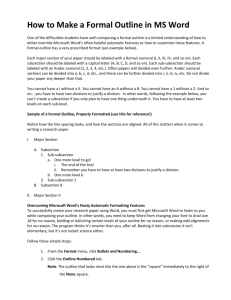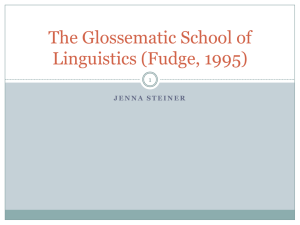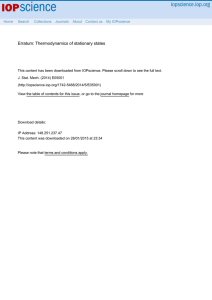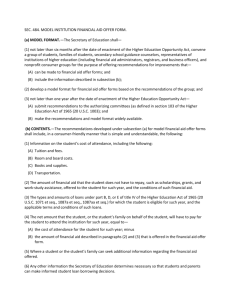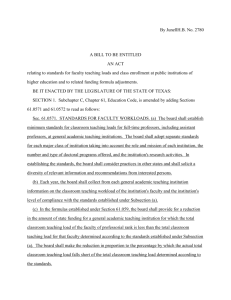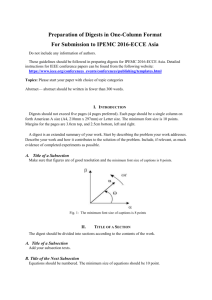Animal Bylaws - WordPress.com
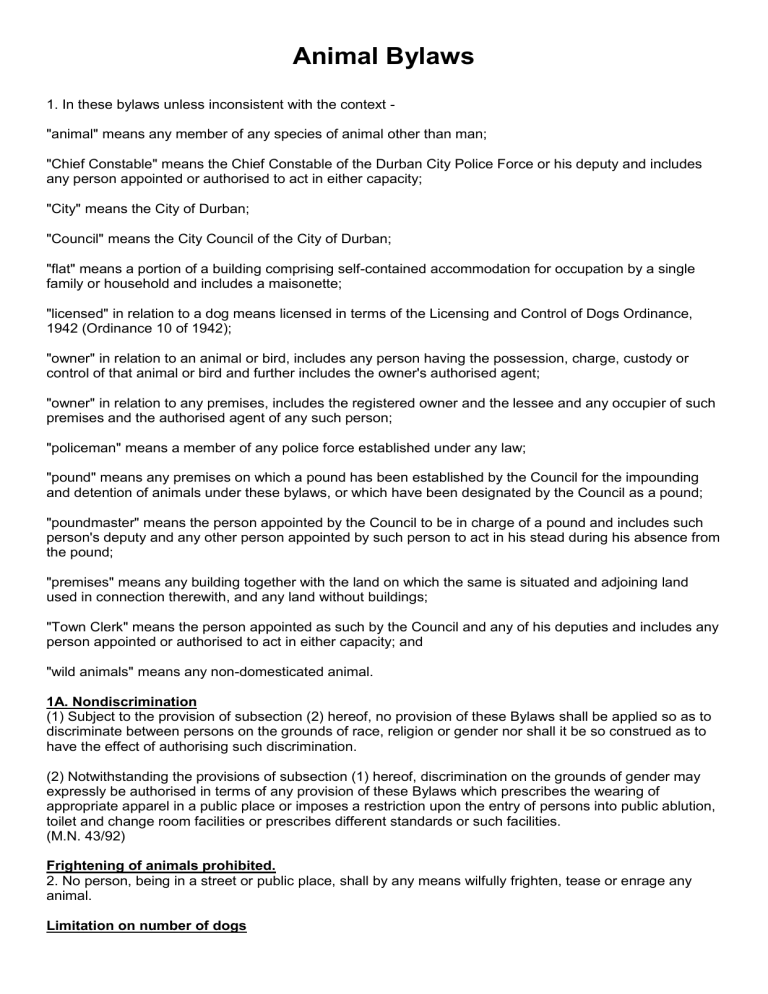
Animal Bylaws
1. In these bylaws unless inconsistent with the context -
"animal" means any member of any species of animal other than man;
"Chief Constable" means the Chief Constable of the Durban City Police Force or his deputy and includes any person appointed or authorised to act in either capacity;
"City" means the City of Durban;
"Council" means the City Council of the City of Durban;
"flat" means a portion of a building comprising self-contained accommodation for occupation by a single family or household and includes a maisonette;
"licensed" in relation to a dog means licensed in terms of the Licensing and Control of Dogs Ordinance,
1942 (Ordinance 10 of 1942);
"owner" in relation to an animal or bird, includes any person having the possession, charge, custody or control of that animal or bird and further includes the owner's authorised agent;
"owner" in relation to any premises, includes the registered owner and the lessee and any occupier of such premises and the authorised agent of any such person;
"policeman" means a member of any police force established under any law;
"pound" means any premises on which a pound has been established by the Council for the impounding and detention of animals under these bylaws, or which have been designated by the Council as a pound;
"poundmaster" means the person appointed by the Council to be in charge of a pound and includes such person's deputy and any other person appointed by such person to act in his stead during his absence from the pound;
"premises" means any building together with the land on which the same is situated and adjoining land used in connection therewith, and any land without buildings;
"Town Clerk" means the person appointed as such by the Council and any of his deputies and includes any person appointed or authorised to act in either capacity; and
"wild animals" means any non-domesticated animal.
1A. Nondiscrimination
(1) Subject to the provision of subsection (2) hereof, no provision of these Bylaws shall be applied so as to discriminate between persons on the grounds of race, religion or gender nor shall it be so construed as to have the effect of authorising such discrimination.
(2) Notwithstanding the provisions of subsection (1) hereof, discrimination on the grounds of gender may expressly be authorised in terms of any provision of these Bylaws which prescribes the wearing of appropriate apparel in a public place or imposes a restriction upon the entry of persons into public ablution, toilet and change room facilities or prescribes different standards or such facilities.
(M.N. 43/92)
Frightening of animals prohibited.
2. No person, being in a street or public place, shall by any means wilfully frighten, tease or enrage any animal.
Limitation on number of dogs
3. (1) After the expire of a period of twelve months from the date of commencement of these bylaws, no person shall keep on premises within the City comprising a dwelling house : -
(a) more than two dogs, whether male or female, where the total area of th e land does not exceed 650mï ¿
½ ;
(b) more than three dogs, whether male or female, where the total area of land exceeds 650mï ¿ ½ ;
(c) more than one unspayed bitch; without the consent in writing of the officer appointed by the Council in terms of section 11(1) of the
Licensing and Control of Dogs Ordinance, 1942 (Ordinance 10 of 1942) and in accordance with such conditions as such officer may impose, and such consent may be withdrawn by such officer at any time; provided that a bitch in respect of which the licence fee appropriate to a spayed female dog is payable in terms of the said Ordinance shall be deemed to have been spayed for the purposes of this section.
(2) For a period of eight weeks from the date of such birth, subsection (1) shall not apply to a person where the number of dogs being kept by him exceeds the number specified in that subsection solely by reason of the birth of a litter.
(3) After the expiry of a period of twelve months from the date of commencement of these bylaws, no person shall keep a dog (whether male or female) in a flat within the City without the written consent of the registered owner of the premises or his duly authorised agent or, in the case of premises in respect of which a sectional title register has been opened in terms of the Sectional Titles Act, 1971 (Act 66 of 1971) of the trustees of the body corporate, which consent may at any time be withdrawn and upon such withdrawal the owner of the dog shall within 30 days remove the dog from the premises; provided that notwithstanding the grant of such consent no person shall keep more than one dog in a flat without the consent in writing of the officer referred to in subsection (1) and in accordance with such conditions as such officer may impose, such consent may be withdrawn at any time.
(4) Notwithstanding the provisions of subsections (1) and (3) above and subject to the submission to the officer referred to in subsection (1) during the period of twelve months from the date of commencement of these bylaws of an application in writing by the owner of licensed dogs the number of which exceeds the limits laid down in either of the said subsections, supported by such information as such officer may require, such owner shall be permitted to retain such excess number of dogs after the expiry of such period, but only during the remainder of the lifetime of the particular dogs concerned and on condition that the other provisions of these bylaws are complied with by such owner in respect of such dogs at all times.
(5) Any person who is aggrieved by a decision of the officer referred to in subsection (1) under this section may appeal to the Council or any committee of the Council to which this function has been lawfully delegated, and the decision of the Council or such committee shall be final and binding.
General prohibitions
4. (1) No person, being the owner of the animal referred to, shall : -
(a) permit or allow any wild animal or any ferocious, dangerous, vicious or diseased animal or any bitch in season to be on any street or public place except while such animal is being transported in or on a vehicle or except with the prior written consent of the Chief Constable and in compliance with any conditions imposed by him and no person shall leave any such animal or allow it to be in a place from where it may stray onto any street or public place;
(b) permit or allow any equine or bovine animal or any sheep, goat, pig or ostrich or a cross-breed of any such animal to be on any street or public place except while such animal is being transported in or on a vehicle or except with the prior written consent of the Chief Constable and in compliance with any conditions imposed by him, which consent shall not be given unless the application therefor is accompanied by the prior written permission of the Medical Officer of Health as defined in section 27(6) and any conditions imposed by him have been complied with or are imposed as conditions by the Chief
Constable and no person shall leave any such animal or allow it to be in a place from where it may stray onto any street or public place;
(P.N. 522/87)
(c) herd or drive any animal or animals referred to in paragraph (b) above or cause or permit the same to be herded or driven in any street or public place except with the written consent of the Chief Constable and along the routes and in compliance with the conditions prescribed by him;
(d) keep within the City any animal which has to his knowledge without provocation and without incitement by a person lawfully acting in the performance of a duty whether as a guard dog handler or in other similar circumstances, attacked and bitten a person or animal otherwise than in defence of itself or its owner;
(e) convey, lead, drive or ride in or through any street or public place any wild, dangerous or ferocious animal or animals which is or are likely to constitute a danger to or to frighten any person or other animal, except with the prior written consent of the Chief Constable and along the routes and in compliance with the conditions prescribed by him;
(f) permit, allow or by any means incite any animal to pursue, attack or rush at any other animal or any person or vehicle or in any other way to interfere with the safety, peace or comfort of any person in any street or public place, except in the exercise of a lawful duty;
(g) permit or allow any animal to trespass on the premises of another.
(2) The owner of any dog which is found in any street or public place otherwise than on a leash held by a person or under some other form of bodily restraint shall be guilty of an offence.
(3) The owner of any animal which in the presence of such owner defecates in any street or public place otherwise than upon the metalled surface of a roadway or in a road drainage channel, shall forthwith remove or cause to be removed the excrement from the street or public place.
(4) Any animal referred to in subsection (1)(a), (b), (d) or (f) or subsection (2) and any ownerless animal may be seized by any policeman or by any officer of the Durban and Coast Society for the Prevention of
Cruelty to Animals who is authorised under provisions of section 8 of the Animals Protection Act, 1962 (Act
71 of 1962), to exercise the powers described or referred to therein, and the provisions of section 8 of these bylaws shall mutatis mutandis apply; provided that no animal referred to in subsection (1)(d) shall be released in terms of section 8(2) prior to the conclusion of any criminal proceedings instituted in respect of an alleged contravention of that subsection. (P.N. 522/87)
(5) Subject to the provisions of section 5 and 8(1)(d) of the Animals Protection Act, 1962 (Act 71 of 1962), where applicable, any animal referred to in subsection (1)(a) and any ownerless animal which is found at large in a street or public place may be destroyed by or on the order of any policeman or by any officer referred to in subsection (4) if in the opinion of such person it is necessary or desirable to do so either in the public interest or for humane reasons.
(6) Upon convicting a person of an offence under sub-section (13(d) the court may, in addition to imposing any other sentence, deprive such person of ownership of the animal to which the charge relates and order that it be handed over to an animal welfare organisation to deal with as that organisation deems fit.
(7) A member of the public who finds an ownerless dog at large in a street or public place may seize it and he shall thereupon take it to a pound.
(8) For the purpose of this section, any dog which is not wearing a badge or in respect of which there are no other means of readily identifying its owner and is not under the immediate control of any person shall be presumed to be ownerless.
Nuisance
5. (l) The owner of any animal or bird which by barking, yelping, crowing or making other noises disturbs the public peace or which in any way causes a nuisance commits a breach of these bylaws if the nuisance or disturbance continues after the expiration of the period specified in a notice issued by the Chief
Constable upon receipt of a written complaint and served on such person requiring him to abate such nuisance or disturbance. (P.N. 522/87)
(2) Upon a second conviction under subsection (1) in respect of the same animal or bird, the court upon finding the person guilty may, in addition to imposing any other sentence, deprive such person of ownership of the animal or bird and order that it be handed over to an animal welfare organisation to deal with as that organisation deems fit.
Seizure for the purposes of forfeiture
6. Upon conviction of its owner for a breach of section 4(1)(d) or section 5(1) the animal or bird to which such conviction relates may be seized by any policeman or by any officer referred to in section 4(4) for the purpose of giving effect to any order of court made in terms of section 4(6) or section 5(2), as the case may be.
Keeping of wild animals and birds
7. (1) No person shall keep any wild animal or bird within the City except with the prior written consent of the Chief Constable and in compliance with any conditions prescribed by him.
(2) Application for such consent shall be made in writing to the Chief Constable and shall be accompanied by a valid Permit issued in terms of the Nature Conservation Ordinance, 1974 (Ordinance 15 of 1974) when such permit is required in terms of such Ordinance for the keeping of such animal or bird, or by proof of possession of such permit.
(3) The Chief Constable shall not refuse an application made under subsection (2) unless he has grounds for believing : -
(a) that the keeping of the animal or bird to which the application relates is likely to be contrary to the public interest or to constitute a danger to health or the safety of persons or other animals or birds or a nuisance either by reason of its nature or habits or because of the nature of the neighbourhood where, or the circumstances under which, it will be kept; or
(b) that the animal or bird is one which is likely to frighten or cause disturbance, annoyance or discomfort to the inhabitants of the neighbourhood or that it is dangerous; or
(c) that the premises on which it is proposed to keep the animal or bird are not fit and proper for the purpose.
(4) In granting consent in terms of subsection (1), the Chief Constable may impose such conditions as he considers desirable, which conditions he may by written notice to the grantee amend or add to from time to time. Any such consent shall be valid only for the period stated therein, provided that the Chief Constable may in his discretion grant on extension from time to time.
(5) The Chief Constable may at any time cancel any consent granted in terms of this section where the owner fails to observe the conditions upon which it was granted or where the Chief Constable is satisfied that the circumstances referred to in subsection (3) hereof have arisen or are likely to arise.
(6) Any person who is aggrieved by a decision of the Chief Constable under this section may appeal to the
Council or any committee of the Council to which this function has been lawfully delegated, and the decision of the Council or such committee shall be final and binding.
(7) An appeal in terms of subsection (6) shall be lodged by giving notice thereof in writing to the Town Clerk within seven days after the date upon which the Chief Constable's decision was communicated to the person concerned and such notice shall set forth the grounds of appeal. A copy of the notice shall be served on the Chief Constable. The Council or committee, as the case may be, may in its absolute discretion uphold or reject any appeal.
(8) The provisions of this section shall not apply to mice, rabbits guinea pigs or other non-carnivorous small animals or birds.
(9) Any animal or bird referred to in subsection (1) for the keeping of which no consent has been given or for which consent has been refused, may be seized and impounded by any person referred to in section
4(4) and the provisions of section 8 shall mutates mutandis apply, provided that no such animal or bird for which no consent has been obtained under this section shall be released in terms of section 8(2) except for the purpose of its removal from the City in accordance with a written undertaking furnished by its owner.
(10) Any person to whom an animal or bird has been released in terms of subsection (9) read with section
8(2) who fails to remove such animal or bird from the City forthwith or who, having removed such animal or bird, returns it or causes it to be returned to the City except under authority of consent granted under this section shall be guilty of an offence.
Impounding, release and sale of animals
8. (1) Any person who seizes an animal or bird in the exercise of powers conferred by sections 4, 6, 7 and
11 shall, subject to the provisions of section 4(5), take such animal or bird to a pound where it shall be impounded.
(2) Any person who claims to be the owner of an animal or bird referred to in subsection (1) shall, subject to the provisions of the proviso in section 4(4) and sections 7(9), 12 and 28, be allowed to remove such animal or bird from the pound on satisfying the pound master that he is the owner of such animal or bird and that any consent required under section 7 has been obtained and, further, if the animal is a dog, that it has been duly licensed in terms of the Licensing and Control of dogs Ordinance, 1942 (Ordinance 10 of
1942), provided that before removing such animal or bird, such person shall pay the fees and charges prescribed by resolution of the Council in terms of section 265 of the Local Authorities Ordinance, 1974
(Ordinance 25 of 1974) from time to time and as set out in section 35 below and any medical or veterinary expenses recoverable in terms of section 6 of the Animals Protection Act, 1962 (Act 71 of 1962), or shall make provision for or secure such payment to the satisfaction of the poundmaster. (P.N. 522/87)
(3) Any animal or bird impounded in terms of subsection (1) which is not claimed within seven days may be sold by the poundmaster in such manner as he deems fit. The proceeds of such sale shall be applied in defraying the fees and charges referred to in subsection (2) and the expenses incurred in connection with the sale of the animal or bird and the balance, if any, shall be forfeited to the Council and paid into the borough fund revenue account if such balance is not claimed by the person who establishes to the satisfaction of the poundmaster that he is entitled thereto within three months of the date of the sale. Any shortfall shall be recoverable from the owner of the animal or bird.
(4) If the poundmaster is for any reason unable to sell any animal or bird referred to in subsection (3), he may dispose of it in such manner as he deems fit, or may cause it to be destroyed.
Bitches in season.
9. (1) Any person referred to in section 4(4) may seize and impound any bitch in season:
(a) found at large in any street or public place within the City;
(b) in respect of which an offence is being committed under section 10(1); or
(c) found straying on property other than that on which it is habitually kept, and take the same to a pound, where it shall, subject to the provisions of section 28 be detained until such time as its period of oestrus has in the opinion of the pound master ended. (P.N. 522/87)
(2) The owner of a bitch impounded and detained in terms of subsection (1) shall be liable to pay to the
Council the cost of conveying it to a pound and to keeping it there for the period that it remains there whether in detention or otherwise, such costs to be calculated in accordance with tariffs prescribed by the
Council by resolution in terms of section 265 of the Local Authorities Ordinance, 1974 (Ordinance 25 of
1974) from time to time and as set out in section 35 below.
(3) Upon termination of the period of detention referred to in subsection (1) the owner may, subject to the provisions of section 12 and 28, remove the bitch from the pound upon payment of all sums due by him in terms of subsection (2) or after securing such payment to the satisfaction of the Poundmaster, provided
that if, within seven days after the end of the period of detention prescribed by subsection (1) a bitch has not been claimed by its lawful owner or the charges payable under subsection (2) have not been paid, such bitch may be spayed by or at the instance of the pound master and may be sold in such manner as he deems fit, provided that at any time prior to the sale of the bitch or its destruction or disposal in terms of subsection (6), as the case may be, the owner may claim it upon payment of all amounts owed by him.
(4) The proceeds of any sale under subsection (3) shall be applied in defraying any medical or veterinary expenses recoverable in terms of section 6 of the Animal Protection Act, 1962 (Act 71 of 1962), in respect of the bitch, the costs payable under subsection (2) up to the date of sale, the costs of spaying as assessed by the poundmaster and all costs of sale, including advertising costs, and the balance, if any, shall be forfeited to the Council and paid into the borough fund revenue account if such balance is not claimed by the person who establishes to the satisfaction of the poundmaster that he is entitled thereto, within three months of the date of the sale.
(5) Any shortfall in the amount owing to the Council in terms of subsection (4) after the sale of the bitch shall be recoverable from its owner.
(6) As an alternative to its sale in terms of subsection (3), or if the bitch cannot be sold, any bitch not claimed within the period referred to in such subsection may be destroyed or otherwise disposed of at the instance of the poundmaster, provided that such destruction or disposal shall not affect the liability of the owner of the bitch for costs and charges payable under this section.
10 . (1) No person shall keep within the City a bitch in season except at a pets' boarding establishment licensed in terms of the Licences and Business Hours Ordinance, 1973 or for the purpose of service at premises approved for such purpose specially or generally in writing by a duly authorised officer of the
Council, or in properly constructed kennels solely for breeding purposes where authority contemplated by regulation 5 of the regulations published under the Licensing and Control of Dogs Ordinance, 1942
(Ordinance 10 of 1942), under Provincial Notice 475 of 1969, as amended, has been granted in respect of bitches so kept and the appropriate licence fees for such bitches have been paid.
(2) No person being the owner of a bitch in season shall permit it to be at large in the City or to be elsewhere than on the premises referred to in subsection (1) except for the purpose of transporting it by vehicle.
Animals and poultry straying on property.
11. Any person referred to in section 4(4) may seize any animal other than an animal referred to in section
13 or any poultry which is straying on any property other than that on which it is habitually kept, provided that the owner of the property upon which it has strayed has consented in writing to such seizure and such owner may detain any such animal or poultry for such period, not exceeding twelve hours, as is necessary to enable it to be impounded or may himself within such period remove it or cause it to be removed to a pound where it shall be impounded.
(P.N. 522/87)
Production of statutory documents.
12. No animal impounded in terms of these bylaws shall be released from the pound until there has been produced to the poundmaster a valid and current certificate of vaccination, removal permit or other document required in terms of any law in respect of that animal.
Impounding of trespassing bovine and other large animals.
13. The owner of any premises upon which any equine or bovine animal or any donkey, sheep, goat, pig or the crossbreed of any such animal is found trespassing may detain such animal and, subject to section 19, may remove it or cause it to be removed to the pound, and he shall either so remove it or cause it to be removed or release it within twenty-four hours after it has been found trespassing, failing which such person shall be guilty of an offence.
Trespass fees.
14. The owner of any premises referred to in section 13 shall, without being required to prove that he has suffered damage as a result of such trespass or the amount of such damage, be entitled to claim from the
owner of such animal a trespass fee as prescribed by resolution of the Council in terms of section 265 of the Local Authorities Ordinance 1974 (Ordinance 25 of 1974), from time to time as set out in section 35 below; provided that the owner of the premises may, if he has suffered damage as a result of the trespass in excess of the trespass fee payable, claim from the owner, in lieu of such fee, the amount of the damage suffered by him by action at law if he has when removing the animal to the pound, notified the poundmaster in writing of his intention to do so and has waived the fee.
Furnishing of particulars .
15. Any person who detains an animal in terms of section 13 shall, when removing it to the pound, furnish the pound master with : -
(a) his name and permanent residential address;
(b) the time and place of detention;
(c) a statement, in writing, of his intention, if any, to claim damages from the owner of the animal in terms of section 14 and a waiver of the trespass fee.
Rescue forbidden
16. No person shall rescue, or attempt to rescue, or interfere with, any animal or animals which have been seized or detained or which are being taken to the pound in terms of these bylaws, and no person shall interfere with, molest or obstruct the person seizing, detaining or removing such animal or animals.
Pound opening times.
17. All animals seized or detained in terms of these bylaws may be taken to the pound at any time during the day or night but the poundmaster shall be entitled to refuse to release impounded animals between the hours of l9h00 and 08h00.
Records and receipts.
18. (1) The poundmaster shall, upon receipt of an animal impounded under section 13 : -
(a) record the particulars furnished in terms of section 15, and enter the same in a book maintained for the purpose;
(b) furnish the person delivering the animal with a receipt reflecting : -
(i) his name;
(ii) a description of the animal; and
(iii) the date and time of delivery.
(2) The poundmaster shall keep a copy of each receipt issued in terms of subsection (l)(b).
Release of large animals detained.
19. Notwithstanding anything in these bylaws contained, whenever the owner of an animal which has been detained in terms of section 13 tenders to the person who has detained it before the removal of the animal to the pound, the amount of the trespass fee payable or, if such person claims damages in terms of section
14, the amount of such damages, such animal shall, upon payment of such amount, immediately be released to the owner and failure or refusal on the part of the person who detained the animal to accept payment or to release the animal shall constitute a contravention of these bylaws.
20 . The owner of an animal which has been impounded in terms of section 13 shall, subject to the provisions of section 12 and 28 be entitled to the release thereof upon furnishing the poundmaster with his permanent residential address and evidence of his identification to the satisfaction of the poundmaster and
upon payment to the poundmaster of the trespass fee referred to in section 14, unless such fee has been waived in terms of section 15(c), as well as the pound and conveyance fees prescribed by resolution of the
Council in terms of section 265 of the Local Authorities Ordinance, 1974 (Ordinance 25 of 1974), from time to time as set out in section 35 below and any medical or veterinary expenses recoverable in terms of section 6 of the Animals Protection Act, 1962 (Act 71 of 1962).
(P.N. 522/87)
Advertising of animals for sale.
21. If an animal has not been released in terms of section 20 within fourteen days after the date upon which it was received in the pound, the poundmaster shall advertise it for public sale in one issue each of an
English and an Afrikaans newspaper circulating in the City together with a description of the animal and details of any brands or identifying marks and the name of the person who impounded the animal.
Date of sale
22. An advertisement in terms of section 21 shall specify that the date, time and place fixed for the sale, which date shall be not less than fourteen days after the date of the last advertisement of such sale.
Proceeds of sale
23. The poundmaster shall after deducting the expenses of the sale and all fees and expenses referred to in section 20, pay the balance of the proceeds, if any, to the Council, to be held by it on behalf of any future claimant, and the poundmaster shall also make an entry of all such sales in a book to be kept for that purpose, provided that unless such balance is claimed by a person who establishes his right thereto to the satisfaction of the City Treasurer within three months of the date of the sale, such balance of proceeds shall be forfeited to the Council. Any shortfall shall be recoverable from the owner of the animal.
Other manner of disposal.
24. If an animal is not sold at the public sale referred to in section 21, the poundmaster may sell or dispose of it in such manner as he thinks fit and any proceeds derived from such sale or disposal shall be dealt with in terms of section 23; provided that if it is not possible to sell or otherwise dispose of the animal it may be destroyed on the order of the poundmaster.
Care of animals.
25. The poundmaster shall take proper care of any animal impounded in terms of section 13 and shall not use any such animal or cause or permit it to be used and he shall be liable to the owner of the animal for any injury to, or loss or death of an animal wilfully or negligently caused by him or any of his servants. In the event of the death or loss of or injury to any animal in the pound, the pound master shall forthwith enter the details of the animal and any injury suffered by it and, in the event of death or loss, the cause of death or loss in his pound book and shall retain in his records any veterinary certificate issued as to the cause of death.
Keeping of bees
26. No person shall keep or allow or permit to be kept any hive or swarm of bees on any premises of which he is the owner or allow or permit any swarm of wild bees to settle and remain on any such premises in either case so as to be a source of nuisance or danger to persons residing in the neighbourhood or to members of the public.
Emergency measures to prevent spread of disease.
27. (1) Whenever in the opinion of the Council's Medical Officer of Health it is necessary in the interest of public health to prevent the spread of rabies or other disease communicable to man, he may by notice published in both official languages in one or more newspapers circulating in the City prohibit dogs, cats and other animals from being allowed to be in any street or public place either within the area of jurisdiction of the Council or any portion thereof referred to in such notice unless they are at all times on a leash held
by a person or under some other form of bodily restraint and such notice shall specify the period during which such prohibition shall remain in force.
(P.N. 446/87)
(2) Any person being the owner of a dog, cat or other animal which is found in a street or public place in circumstances which conflict with the terms of a notice published in terms of subsection (1) shall be guilty of an offence.
(3) Any dog, cat or other animal which is found in any street or public place in circumstances which conflict with the terms of a notice published in terms of subsection (1) and any animal which is on reasonable grounds suspected of being infected with the disease referred to in the said notice may be seized by any person referred to in section 4(4) or any officer of the Council authorised by it and an animal so seized shall be taken to a place appointed by the Medical Officer of Health for the purpose. An animal which has been so seized or which is otherwise delivered to the place so appointed may during the period that a prohibition is in force in terms of subsection (1) be impounded there for as long as the Medical Officer of Health deems it to be necessary in the interests of public health or for the purpose of preventing the spread of disease; provided that a dog, cat or other animal found in a street or public place which is suspected of having rabies or any other disease referred to in a notice published in terms of this section may be destroyed by a person referred to in section 4(4) and the owner of such animal shall not be entitled to compensation.
(4) Any person or officer referred to in subsection (3) may enter upon any premises for the purpose of searching for, examining or seizing any animal for the purposes of that subsection.
(5) The provisions of section 8(2) to (4) shall mutatis mutandis apply in respect of any dog, cat or other animal seized or impounded in terms of subsection (3) hereof which is not claimed by its lawful owner upon expiry of the period of detention fixed by the Medical Officer of Health and the period of seven days referred to therein shall be calculated either from the date of seizure or expiry of the period of detention, as the case may be. For the purpose of such provisions a place appointed in terms of subsection (3) shall be deemed to be a pound and the person in charge thereof to be the poundmaster.
(6) For the purpose of this section the expression "Medical Officer of Health" shall include his Deputy and any officer of the Council acting in either capacity.
(7) During the period that a prohibition in respect of rabies is in force in terms of subsection (1) the owner of an animal that is required to be immunised under regulations made in terms of the Animal Diseases Act,
1984 (Act 35 of 1984) shall when called upon to do so by a person referred to in section 4(4) or any authorised officer referred to in subsection (3) either in person or by a notice in writing produce to such person or officer either forthwith or in the case of a notice within a time and at a place specified in the notice a valid certificate of immunisation issued in respect of that animal in terms of the said regulations and failure or refusal so to produce such certificate shall be an offence. (P.N. 446/87)
Destruction of animals.
28. Whenever the poundmaster is of the opinion that an animal impounded or detained in terms of these bylaws is so dangerous, vicious, diseased or severely ill or is in such a physical condition that it ought to be destroyed, either in the public interest or for humane reasons, he may, subject to compliance with section
5(1) of the Animals Protection Act, 1962 (Act 71 of 1962), where applicable, cause such animal to be destroyed and the owner of such animal shall not be entitled to compensation.
Costs of destruction.
29. The costs of destruction of an animal in terms of sections 4(5) and 28 shall be recoverable by the
Council from the owner of the animal as a civil debt.
Powers of entry.
29A A person referred to in section 4(4) shall have the right to enter any premises at any time for the purpose of exercising a power vested in him under these bylaws or whenever there are reasonable grounds for suspecting that an offence is being committed under these bylaws.
(P.N. 522/87)
Indemnity.
30. Subject to section 25, neither the Council nor the Durban and Coast Society for the Prevention of
Cruelty to Animals nor any officer or employee of either of such bodies nor any policeman shall be liable for the death or loss of or any injury suffered by or damage caused to or disease contracted by any animal during or as a result of its seizure, detention impounding or release in terms of these bylaws.
No duty to trace owner
31. Neither the person who seizes and impounds or detains an animal in terms of these bylaws nor the poundmaster shall be under any duty to trace the owner of such animal or to notify such owner of the seizure, impounding or detention.
Presumptions
32. For the purpose of these bylaws : -
(a) a person shall be held to have permitted, suffered or allowed an event to happen or a situation to arise if he fails to take reasonable steps to prevent it; and
(b) the owner of an animal shall be presumed to have permitted or allowed the actions of such animal, and the owner of any premises who resides thereon shall be presumed to be the owner of, and to be keeping any animal which is found on such premises, until the contrary is proved.
33.
Notice required to be given in terms of any provision of these bylaws to the owner of premises, may, unless otherwise provided, either be served personally upon him or his known agent, or be served by being posted to a known address of such person or of his agent, or if there be no such known address, by being posted under cover to the occupier, or if there is no person in actual occupation by being affixed in a conspicuous part of such premises; provided that any reference herein to posting shall not imply any necessity for registration.
Offences and penalties.
34. (1) Any person who -
(a) contravenes any provision of these bylaws; or
(b) contravenes any conditions imposed upon the granting of any application, consent, approval, concession, relaxation, permit or authority in terms of these bylaws; or
(c) fails to comply with the terms of any notice served upon him in terms of these bylaws; shall be guilty of an offence for which the penalties provided for by section 266(7)(a) of the Local Authorities
Ordinance 1974 (Ordinance 25 of 1974) are hereby prescribed.
(2) Failure to comply with the terms of any condition or notice referred to in subsection (1)(b) or (c) above shall constitute a continuing offence and a person failing to comply with the terms of such condition or notice shall be guilty of a separate offence for each day during which he fails to comply with such terms.
